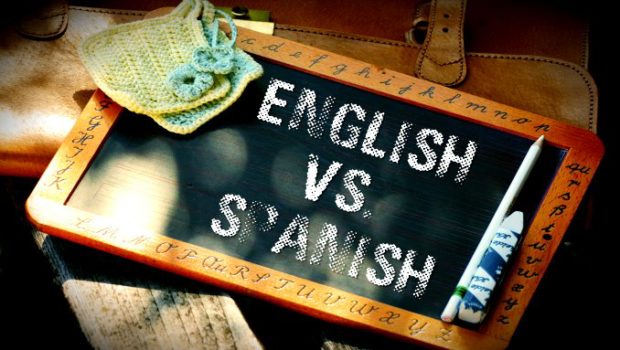Learning Spanish vs. Learning English
Yes, we expats here in Cuenca have quite a formidable job to learn the language of our adopted home. It surely ain’t easy. And g-knows I still struggle with my snail-paced progress here in Ecuador (not to mention, the added confusion of presently trying to learn a handful of Japanese “kon’nichiwa” (hello), “arigatou” (thank you), and of course “toire” (toilet) to my linguistic arsenal), but…
As a professional EFL (English as a Foreign Language) teacher, I understand better than most – just how likewise bewildering it must be for Ecuadorians to wrap their heads around my own native tongue.
Case in point:
As I lay in bed after my neighborhood English lesson the other night, I got to thinking…
How handy the Spanish feminine/masculine word endings are compared to English. For example:
hermana/hermano vs. 2 entirely different English words to learn how to pronounce, comprehend and write: sister and brother.
novia/novio vs. 2 different words to learn: girlfriend and boyfriend.
tia/tio vs. two completely different words: aunt and uncle.
Indeed, simple pairs like tia/tio, amiga/amigo, prima/primo, et al – handily tells us if we’re talking about girls or boys in a single word without missing a beat. Can you just imagine how baffling it must be for Ecuadorians when they hear us talk about a “friend” a “cousin”, or an “aunt” vs. an “uncle”?
And for my poor, beleaguered Cuencano students clustered in the tiny “classroom” in my El Centro apartment – that’s not even counting the English insufferables like:
“read” (present tense pronunciation) vs. “read” (past tense) vs. “red” and…
“there”, “their” and “they’re”, along with “its” vs. “it’s” (which many native English speakers can’t seem to keep straight!)
bare/bear; break/brake; way/weigh; desert/dessert
silent “r” in February; silent “d” in Wednesday, not to mention that dreadful silent “s” in “island” – and let’s not even mention “right”, “bought”, “sigh” and “scissors”.
And lest we forget the (seemingly) nonsensical uses for “make” vs. “do”.
Needless to say, I could go on and on.
Poor things.
Then again…
We Spanish learners, have to somehow noodle out the detestable preterit vs. imperfect tenses. And there are those *5* syllables for a simple “carrot” (zan-a-hor-i-a – and on top of that, the “h” is silent!)
So… all things considered – I have to say it’s pretty much a WASH! 😀

P.S. I’ll soon be once again dragging my trusty purple rollie down this mountain and onto a trio of silver birds bound for the other side of the globe, so the lights here at Casa TravelnLass will necessarily go dim for a spell.
But I do hope to sporadically post to Facebook as I stumble through the convoluted train and subway stations of Japan, so do check THERE for pics and stray updates.







 Off-the-beaten-path travel is my passion, and I’ve always lived life “like a kid in a candy store” – eager to sample as many flavors as I can. Indeed, my life motto has long been:
Off-the-beaten-path travel is my passion, and I’ve always lived life “like a kid in a candy store” – eager to sample as many flavors as I can. Indeed, my life motto has long been:
















We were surprised by how much Spanish we picked up during our full-time travels in Mexico, Central & South America. However, any but the simplest verb tenses threw me so my favorite witticism was, ‘I’m just going to live life in the present.’ One thing that really sunk home for me though was a response to all those foreign-phobic people who say, “Why can’t they just speak English?” or make fun of a foreign accent.” I have nothing but admiration for those who put the time and effort into learning a new language!.
Indeed Anita, learning a foreign language surely does take boatloads of persistent time and e-f-f-o-r-t. And worse, the learning process is so darn incremental that it often seems hopeless. But “poco a poco” it DOES pay off.
Shoot, even the 10 measly Japanese words I memorized before I landed in Tokyo, paid off handsomely. The (otherwise notoriously reserved) Japanese bent over backwards to help me with whatever I needed, just by my hesitant murmur of a butchered “sumimasen” (excuse me).
As for the latter folks you mentioned that expect the entire globe to speak their native tongue, well… I’d have to agree – “foreign-phobic” is putting it nicely.
When I volunteered as a native English speaker at an English immersion experience for Spaniards in Spain, I learned that “phrasal verbs” are considered a PITA by English learners. One site defines phrasal verbs as: “A phrasal verb is a phrase that’s made up of a verb and another word or two, usually a preposition but sometimes an adverb.” Until I participated in that program, I had never heard the term “phrasal verb”. For example, “look up” can mean to look up in the sky, or to search for in a reference book. BTW, I add the “subjunctive tense” in Spanish to the list of “detestables”.
Wishing you safe, fun and interesting travels in the Land of the Rising Sun. At least Spanish uses the same alphabet we do. Japanese has 3 different alphabets—4 if you count Romanji which does use the Roman alphabet.
Yes Suzanne, phrasals are always a part of my EFL lessons, and most confusing to my students. I learned how to teach them in my CELTA course. Indeed, (unless you’re trained in EFL) most native English speakers are unaware of half the crazy grammatical nuances of the English language – I had to learn the grammar (and more importantly the “why”) of my native tongue in order to be able to teach it.
And yes, those Japanese kanji are surely a mystery. Thank goodness Spanish uses pretty much the same alphabet as English (albeit pronounced very differently). Perhaps surprisingly – so does Vietnamese!
“detestable preterit” – I like that. Wouldn’t surprise me if there were more irregular conjugations in that tense than in all the rest of the language. Learning those were painful, rote memorization.
Don’t know if this is worse. Portuguese has simple pairs that aren’t so simple. Grandfather/mother are avô and avó. The circumflex (ô) means your tongue is nearer to the roof of your mouth, but not as near as ‘close’ vowels. The accent (ó) means you tongue is nearer to the floor of the mouth but not as near as ‘open’ vowels. Well, that’s one way to teach a language learner the importance of context to fill in the words you didn’t understand as they flew past.
Have a great time in Japan!
Ugh. Those convoluted tongue acrobatics of Portuguese sound horrible – even worse than those 6 insufferable tones of Vietnamese. That’s another nice thing about Spanish – with the exception of learning to roll those rr’s – pronunciation is easy-peasy.
So true! I find myself wanting to apologize to my students for all the eccentricities of English. 🙂 The spellings and pronunciations can just be crazy!
Anyhow, have a wonderful time in Japan. I’ll look forward to the pics and stories.
Cheers!
Cindy
Thanks Cindy, and I look forward to you catching up on your Nepal adventures on your new blog. Next up (for you): Good Morning VIETNAM!!!